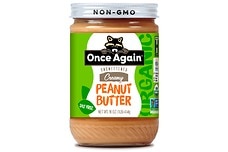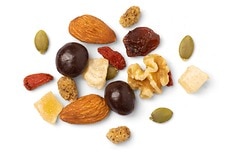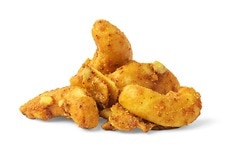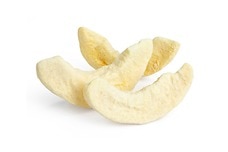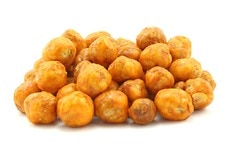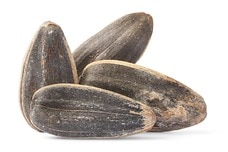Healthy Snacks for Studying & Concentration
Focus and concentration are critical whether you're studying for exams in school, learning new concepts at your job or simply enjoying an interesting read. Today, we're all subjected to a nearly constant barrage of information and interruptions from television, computers and smartphones; and, our ability to stay on task has suffered as a result. In fact, data recently published by Statistic Brain (2015) found that, between the years 2000 and 2015, the average person’s attention span fell by 33% to an average of only 8.25 seconds. That’s about a second less than the attention span of a goldfish!
Boosting your brainpower
Your brain depends on a careful balance of both electrical and chemical reactions for thought, concentration and memory; and, if you dislike the idea of being bested by a goldfish, there are some pretty simple things you should do to help ensure your brain is primed for just these sorts of activities.
Plenty of rest and a distraction-free environment are certainly important, but it's also critical to ensure your brain is getting the steady stream of nutrients it needs to support optimal brain health and function. While foods like sugary snacks and caffeine-filled beverages may help provide a quick burst of energy, their effects are short-lived – and what's worse, they can often leave you feeling tired and worn once those initial effects wear off.
Ideally, you want to choose specific types of “brain food” that help you focus by supporting both the electrical and chemical reactions necessary for cognition and the nutritional needs of the brain tissue itself.
Healthy Study Snacks
Although there's been plenty of research into the effects of nutrients on diseases, only recently has scientific attention turned towards nutrition’s impact on brain function. Nearly everyone has heard the saying, “fish is brain food,” but not everyone cares for fish; and, certainly, fish is not the most convenient snack food. However, understanding what it is about fish - specifically, fatty fish - that supports concentration and brain health can help you recognize what makes for a smarter snack.
Fatty fish like salmon and mackerel contain nutrients called essential fatty acids that support brain function and health. These fatty acids promote “brain plasticity,” which is heavily tied to a person’s ability to learn, adapt and remember. They also support nerve activity and signaling in the brain, which help facilitate memory and learning processes (Gómez-Pinilla & Tyagi, 2014). Essential fatty acids are called "essential" because our bodies cannot produce or synthesize them, which means we must derive them from the foods we eat (Gómez-Pinilla, 2008).
The good news is, while fish is a good source of these acids, it's not the only source. So what other foods contain essential fatty acids and also have the advantage of being more “snack friendly”? Nuts and seeds! Specifically, walnuts, pumpkin seeds, sunflower seeds, Brazil nuts, pecans and flax seeds. Oils made from nuts and seeds also contain essential fatty acids, which means snacking on baked goods containing these oils can also boost your intake (Linus Pauling Institute, n.d.).
If your snacking habits just don't feel complete without a touch of sweetness thrown in, try chocolate-covered nuts and trail mixes. A combination of nuts, seeds and dark chocolate can provide you with the nutritional benefits your brain needs for deep focus and concentration while also satisfying your sweet tooth. And there's an added benefit to indulging with your study snacks – as studies suggest eating chocolate can have a beneficial effect on your mood, which could make focusing and concentrating more pleasurable and less stressful (Dolan, 2013).
Study smarter with these quick tips from our Health Nut and Registered Dietitian, and be sure to check out her accommodating recommendations and recipes below:
- Take a study break to snack rather than mindlessly snacking while you study.
- Snack from a bowl instead of the bag so you can keep track of your portion sizes!
- Stay hydrated too! Sip on water or seltzer water while you’re studying.
Recipes for Healthy Study Snacks
While a bag of snacks screams convenience, there’s something to be said about fresh foods and the uniquely refreshing feel they offer. These recipes were selected for their inclusion of ingredients rich in fatty acids to help support your study habits.
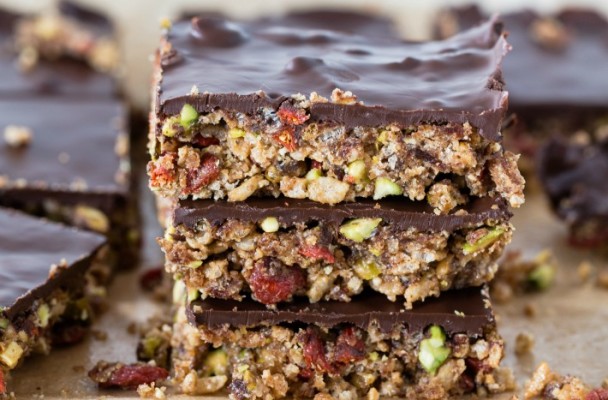
Chocolate Goji Berry Bars Recipe {gluten-free}
These delectable sweets utilize almond butter and pistachios for a healthful helping of fatty acids, antioxidants, and carbohydrates to fuel your brain and body while you focus.
Ingredients: Pitted dates, almond butter, quinoa puffs, goji berries, raw pistachios, coconut oil, dark chocolate chips.
Total Time: 20 minutes
| Yield: 8 bars
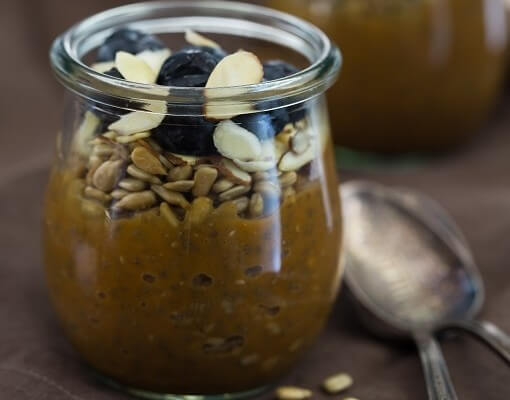
Pumpkin Chia Seed Pudding Recipe
Another source of brain-boosting nutrients, this pragmatic pudding provides a boost of energy to keep you focused throughout your study session.
Ingredients: Milk, pumpkin puree, chia seeds, maple syrup, pumpkin spice, sunflower seeds, sliced almonds, fresh blueberries.
Total Time: 10 minutes
| Yield: 4 servings
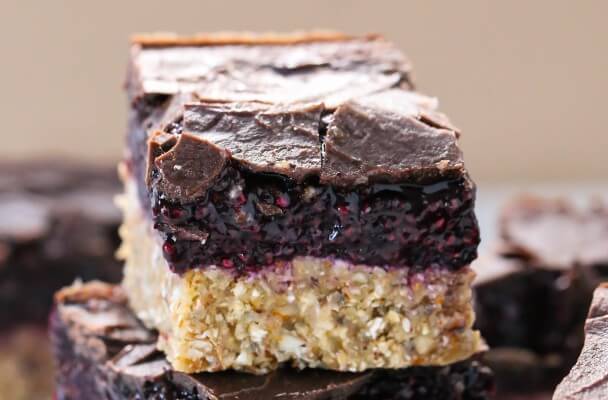
Blueberry Chia Jam Bars Recipe {gluten-free, vegan}
A bit more on the sweet side, this healthy dessert is packed with antioxidants, fatty acids, and carbohydrates with a surprisingly modest calorie count.
Ingredients: Raw almonds, gluten-free rolled oats, chia seeds, maple syrup, water, vanilla or almond extract, blueberries, cacao powder, coconut oil.
Total Time: 30 minutes
| Yield: 16 mini bars
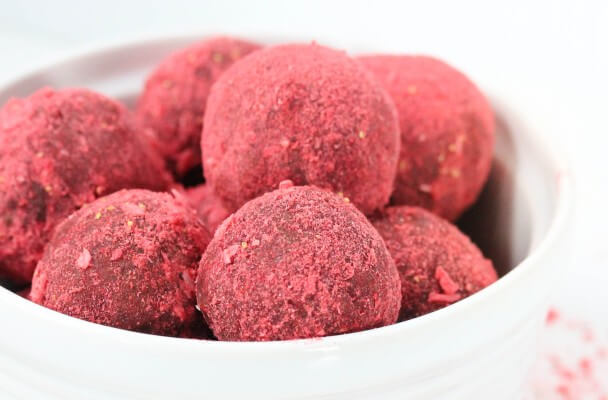
Almond Truffles Recipe {gluten-free, vegan}
Another delectable dessert that doubles as a brain booster- these bites blend the antioxidants and fatty acids of almonds and flaxseed into one delicious treat!
Ingredients: Pitted dates, almond flour, almond butter, water, flaxseed meal, freeze-dried raspberries, unsweetened shredded coconut.
Total Time: 15 minutes
| Yield: 14 - 16 truffles
Snack Recommendations for Studying
When it comes to making the grade, studying is a must! Rather than snacking on empty calories, stock up on nutrient-rich snacks that will provide your body with important nutrients like vitamin E and vitamin K that are linked to boosting brain power. For more healthy snack ideas for studying, check out our Late Night Healthy Snacks page.
Healthy Eating
- Healthy Highlights
- 5 Uses for Cacao Powder
- 5 Ways to Eat Farro
- 6 Best Gluten-Free Foods
- Alcohol and the Body
- Almond Flour Recipes
- Anti-Aging Superfoods
- Beat the Afternoon Slump
- Benefits of a Plant-Based Diet
- Benefits of Baobab
- Benefits of Cashews
- Benefits of Coconut Oil for Hair
- Benefits of Coconuts
- Benefits of Dates
- Benefits of Fenugreek
- Benefits of Garcinia Cambogia
- Benefits of Goji Berries
- Benefits of Kale Chips
- Benefits of Monk Fruit Sweetener
- Benefits of Peanuts
- Benefits of Pecans
- Benefits of Pistachios
- Benefits of Pumpkin Seeds
- Benefits of Spelt Flour
- Benefits of Steel Cut Oats
- Benefits of Sunflower Seeds
- Benefits of Tiger Nuts
- Benefits of Turmeric
- Benefits of Walnuts
- Benefits of Wheatgrass
- Best Food Fads
- Cacao vs Cocoa
- Caffeine-Free Energy Foods
- Chocolate That's Good for You
- Diet vs. Exercise
- Fat Burning Foods
- Food Myths Debunked
- Foods for Bone Density
- Foods for Colon Health
- Foods for Healthy Hair
- Foods for Healthy Skin
- Foods to Help Sleep
- Foods to Reduce Stress
- Green Tea Benefits
- Healthy Baking Flours
- Heart Healthy Habits
- High Protein Health Risks
- How to Boost Your Metabolism
- How to Lose Weight While Aging
- How to Throw a Vegan BBQ
- Kaniwa vs Quinoa
- Little Health Foods
- Low-Carb: Fad or Friend?
- Making Healthier Desserts
- Mediterranean Diet Meal Plan
- Natural Beauty Products
- Nuts for Weight Loss
- Preparing Vegan Meals
- Preventing Muscle Degeneration
- Rare Superfoods
- Reduce Sugar Intake
- Save Time By Going Vegan
- Smarter Snack Swaps
- Smoothie Ingredients
- Soy Protein vs Whey Protein
- Starting a Plant-Based Diet
- Steel Cut vs Rolled Oats
- Sugar Substitutes
- Vegan Proteins
- Vegan Substitutions for Fall Recipes
- Why Go Vegan
- Healthy Meals
- Healthy Recipes
- Sports Nutrition
- Nutrition and Special Diets
- 21 Day Fix
- 5 Popular Diet Similarities
- Alkaline Diet
- Anti-Inflammatory Diet
- Calorie Counting
- Carb Cycling Diet
- Celiac Disease
- Cholesterol
- Clean Eating
- Crohn's Disease
- DASH Diet
- Detox Diet
- Diabetes
- Diabetes Diet
- Diet Pill Dangers
- Fat Burning Foods
- Gluten-free Diet
- Glycemic Index
- Heart Health
- High Blood Pressure Diet
- High Fiber Foods
- How to Eat Healthy
- How to Lower Blood Pressure
- Hypertension
- IBS Diet
- Ketogenic Diet
- Liquid Diet
- Low GI Foods
- Low-Carb Diet and Foods
- Low-Fat High-Carb Diet
- Mediterranean Diet
- Mediterranean Diet Foods
- Military Diet
- Nutrition Labels Explained
- Paleo Diet
- Raw Food Diet
- Superfoods
- Sustainable Weight Loss
- Thrive Diet
- Vegan Diet
- Vegetarian Diet
- Weight Loss Shakes
- Whole30
- Vitamins, Minerals & Nutrients

